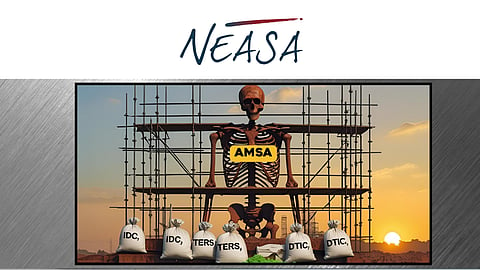ArcelorMittal South Africa: Time for tough decisions - Gerhard Papenfus
Key topics:
AMSA threatens to shut long steel plants by September 2025
Billions in state aid failed to rescue AMSA’s operations
Protectionism is damaging South Africa’s steel downstream industry
Sign up for your early morning brew of the BizNews Insider to keep you up to speed with the content that matters. The newsletter will land in your inbox at 5:30am weekdays. Register here.
Support South Africa’s bastion of independent journalism, offering balanced insights on investments, business, and the political economy, by joining BizNews Premium. Register here.
If you prefer WhatsApp for updates, sign up to the BizNews channel here.
The auditorium doors will open for BNIC#2 on 10 September 2025 in Hermanus. For more information and tickets, click here.
By Gerhard Papenfus*
Despite numerous attempts at salvation, it does not come as a great shock that AMSA has, once again, threatened closing down its long steel plants in Newcastle and Vanderbijlpark by September 2025.
Since June 2024, in an attempt to save its long steel production line, AMSA has been provided with a R1 billion (IDC) working capital facility, a R380 million (IDC and dtic) shareholders’ loan, another R1.683 billion (IDC) facility and R417 million (UIF TERS) funding, this while benefitting from extensive and ever-increasing import- and safeguard duties.
Clearly, throwing money at the problem never was, and never will be the solution.
Nobody disputes the fact that a proficient and cost-effective primary steel producer is an asset to a country’s economy. However, the pertinent question that needs to be asked is, at what stage does a country’s primary steel producer become a liability, when a country must then rather allow for market powers to dictate whether that primary steel producer has a continued right to exist? At what point does the cost of keeping that primary steel producer alive, outweigh the benefit it offers the country?
While Government has introduced excessive measures to protect AMSA, the steel industry has deteriorated as a direct result of the restrictions that these government-measures have placed on its ability to access affordable steel. AMSA has blamed the weak local steel demand and consumption as a major contributing factor to its downfall, together with so-called cheap imports. However, what it fails to admit is that its own inability to supply steel or to do so at affordable pricing, while effectively preventing its customers from importing, are major contributors to the decline of its own customer base.
Thus, while these protectionist measures kept AMSA alive, they simultaneously eroded AMSA’s customer base, which is essential for AMSA’s continued existence.
Although it may prove challenging to operate optimally without the primary steel producer initially, this is a challenge which the industry will have no choice but to overcome, because, at the current rate, AMSA is no longer a long-term option. The longer the AMSA corpse is propped up, the quicker the downstream will wane. So, the longer it takes for the inevitable to realise, the less of the downstream will survive.
The point is this: AMSA cannot survive without the downstream, and the downstream cannot survive with AMSA - at least not in the current regime.
For the steel downstream to survive, let alone prosper, it needs a reliable provider of affordable, high-quality steel. AMSA, most certainly, is not that.
In any event, the mini-mills will remain, which will, at least to some extent, fill the gap left by AMSA’s absence. The remainder can be made up through imports. The steel downstream will survive without an AMSA.
Within its socialistic frame of mind, its total lack of understanding of, and aversion to a free market, Government has taken it upon itself to arrange matters of trade, without any concept of the consequences. Within a socialistic framework, the application of free market principles (which is the only way trade can operate successfully) cannot manifest.
It is extremely economically naive for a government to interfere and control an industry where the various role players, with vastly different and competing interests, would create a natural economic equilibrium on their own, through the application of free market principles and market forces.
Government is benefitting from the massive revenue stream created by the duties. It is therefore quite likely that Government’s judgement in this matter is clouded and that it will not relinquish this income, despite its destructive effect on the country’s steel industry.
It is not without sympathy that NEASA makes the above statements; job losses are always disastrous, especially for those who are directly affected. However, there comes a time for tough decisions to be made. The continued protection and subsidising of AMSA will lead to much more severe consequences for the entire industry in future.
*Gerhard Papenfus is the Chief Executive of the National Employers' Association of South Africa (NEASA).

